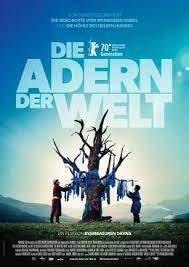![]() 1/2
1/2
Germany | Mongolia 2019
Opening July 29, 2021
Directed by: Byambasuren Davaa
Writing credits: Byambasuren Davaa, Jiska Rickels (collaborating)
Principal actors: Bat-Ireedui Batmunkh, Enerel Tumen, Yalalt Namsrai, Algirchamin Baatarsuren
 Die Adern der Welt is like experiencing poetry in motion using all one’s senses. Oscar-nominated screenwriter-director Byambasuren Davaa’s script is strong, tightly interweaving themes that unite, and divide people the world over. Davaa then expertly coalesces the different veins of the story, patiently and meticulously in her fourth film while directing attention to the threats on Mongolian nomads’ rituals and lifestyle. Indigenous clans are being squeezed off the naturally rich land at the same time as water resources and fisheries are being devastated by international mining companies, once Mongolia’s underground raw materials became a commercial hunting ground.
Die Adern der Welt is like experiencing poetry in motion using all one’s senses. Oscar-nominated screenwriter-director Byambasuren Davaa’s script is strong, tightly interweaving themes that unite, and divide people the world over. Davaa then expertly coalesces the different veins of the story, patiently and meticulously in her fourth film while directing attention to the threats on Mongolian nomads’ rituals and lifestyle. Indigenous clans are being squeezed off the naturally rich land at the same time as water resources and fisheries are being devastated by international mining companies, once Mongolia’s underground raw materials became a commercial hunting ground.
Bat-Ireedui Batmunkh’s performs compellingly as 12-year-old Amra; he is unapologetically his father’s son. Initially, Amra concentrates on getting his parents to sign the form allowing him to participate in, and—improbable, but kids like to dream—perform before the televised Mongolia’s Got Talent audience. The close-knit family’s routine is in harmony with the land’s heartbeat: Yalalt Namsrai and Enerel Tumen, as Erdene and Zuya, exemplify the comradely equality Mongolian couples have. He is a naturally gifted mechanic and sells her homemade cheese at market, while Zuya and younger daughter Altaa, charmingly portrayed by Algirchamin Baatarsuren, tend their herd. Erdene, a natural leader and traditionalist, rallies neighbors to fight the encroaching mining companies, until a life-altering accident when priorities shift and change overnight. That is when Amra’s quiet single-minded determination astounds the community.
Veins of the World, Davaa’s first narrative film, feels like a documentary, since its foundation is factual, and, other than the cast, they filmed within the Mongolian steppe environs and among the natives. Talal Khoury’s handcrafted cinematography is discerning, inclusive and richly adjusts from long to close-up shots for visual ambience and impact. Anne Jünemann’s spot-on editing respects the director’s pacing, and has some spectacularly timed sequences and transitions, e.g., the accident. Moving along with Veins visual rhythm is John Gürtler and Jan Miserre’s dazzling music. The title’s implication is clear: veins connect humanity, just as Mother Earth’s veins connect humans to life-sustaining substance. Without protection, as this beautiful journey emphasizes, a (indigenous) lifestyle is fading before our eyes. German synchronization, 95 minutes ( )
